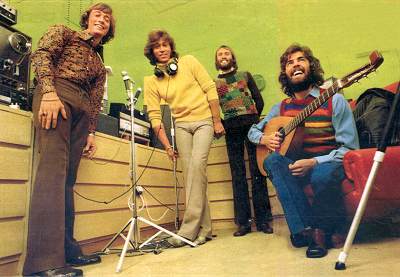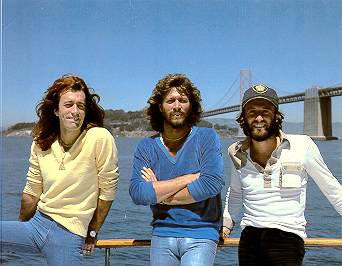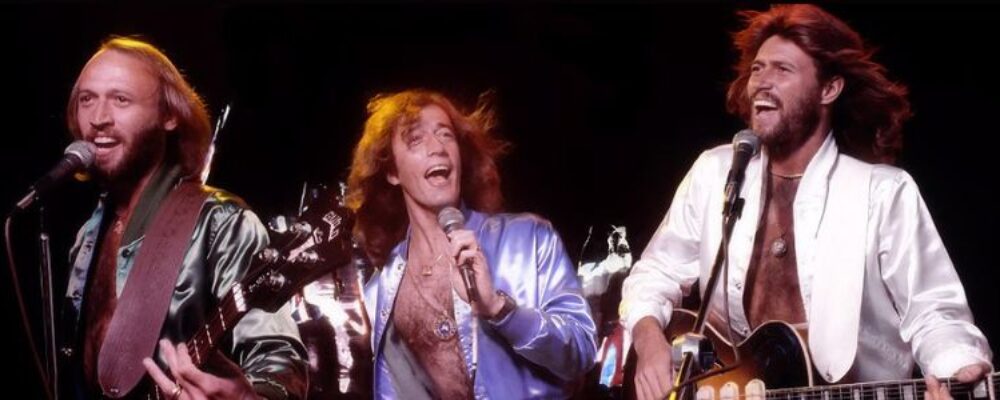Legends : Bee Gees

Copyright 1999. VH1 incorporated
Transcription Copyright 2002 by Janel Clayton Miller.
SEGMENT 4
NARRATOR: The newly-reformed Bee Gees entered the studio and wrote their next two hits, “Lonely Days” and “How Can You Mend a Broken Heart?” in one afternoon.
CLIP OF “HOW CAN YOU MEND A BROKEN HEART?”,BY THE BEE GEES
NARRATOR: Barry, Robin and Maurice had proved something to the world and to themselves. No matter how far down they were,they could always get back on top if they stuck together.
CLIP OF “HOW CAN YOU MEND A BROKEN HEART” BY THE BEE GEES
NARRATOR: Over the next few years they had to hang on to that faith. During the early 1970’s the music world changed. British pop had faded in favor of hard rock like Led Zepplin and The Who. And The Bee Gees popularity faded with it.
CLIP OF “SAW A NEW MORNING” BY THE BEE GEES
NARRATOR: As children, the brothers had seen their father’s fortunes change when big bands went out of fashion. Now it was happening to them.
BARRY: From 1970 to 1974 we couldn’t sell a record to save our lives. I guess what happens is, at the end of every decade, the whole business says ‘well everyone from last decade, step over to the left and all those who want to be big in the new decade, come on in.’So the business treated us like that. The media in England, the radio said, ‘well the Bee Gees are finished’ and like a lot of acts like us, it was the end of our period.
CLIP OF “RUN TO ME”, BY THE BEE GEES

NARRATOR: In 1973, the Bee Gees turned in a new album, and Atlantic Records rejected it. The brothers decided it was time for a change. For their next album they employed R & B producer Arif Mardin, who had worked with Aretha Franklin, Hall and Oates, and The Average White Band. ‘Mr. Natural’ was not a hit, but the brothers were inspired by their new sound and determined to stick with it.
BARRY: Eric Clapton suggested we try a studio, he had just done “461 Ocean Boulevard” and he said, ‘go to America, because America might be a different inspiration for you.’ And there was I think a need to get away from Beatle psychedelia. I think everyone was trying to escape from that.
NARRATOR: Inspired by the new soul of Stevie Wonder, as well as the Philadelphia sound of The Stylistics and Delfonics, the Bee Gees set out to make their own R & B record.
ROBIN: Yeah, we made the transition to um, adapt to what was happening in the U.S. at that time. It was through people like Arif Mardin, of course he was a brilliant R & B producer. We were writing our music to begin with, he just flushed it out to a degree where it was second nature to us.
CLIP OF “NIGHTS ON BROADWAY”, BY THE BEE GEES
NARRATOR: Arif Mardin encouraged Barry to develop his falsetto voice.
BARRY: We were looking for some coloring or ad-libs or just scats singing of some kind at the end of “Nights on Broadway”. And Arif said, can anybody scream in tune, or can you scream or can you do something that becomes much more intense. I was the volunteer that went out to try that.
NARRATOR: The resulting album, “Main Course”, was a radical departure for the Bee Gees. Most of the record was funky, up-tempo soul. Resorting to an old trick, Stigwood sent the first single out to radio stations with a blank label, not listing the group’s name. “Jive Talkin'” went to Number One.
CLIP OF “JIVE TALKIN'”, BY THE BEE GEES
MAURICE: (laughs) I first got a sign when my bank manager called me and said, ‘about that loan’. I wondered what he was talking about. Because I had went in earlier and they said they’d have to think about it because we had nothing really, the three of us. He said, ‘I hear you’re number one in America now’. I said, ‘What’? And that’s how I found out.
NARRATOR: Although some of the group’s old fans felt alienated by the new sound, the album earned the Bee Gees millions of new listeners with its’ three top ten hits, “Jive Talkin'”, “Nights on Broadway”, and “Fanny (Be Tender with my Love)”.
CLIP OF “FANNY (BE TENDER WITH MY LOVE)”, BY THE BEE GEES
NARRATOR: When Arif Marden was unable to produce the next Bee Gees’ sessions, he encouraged the brothers to do it themselves. It worked. The next single went to number one.
CLIP OF “YOU SHOULD BE DANCIN'”, BY THE BEE GEES
NARRATOR: In 1977, Robert Stigwood moved his company, RSO, to America. Barry and Maurice bought homes in Miami. Stigwood had taken an interest in the youngest Gibb brother, Andy.
CLIP OF “YOU SHOULD BE DANCIN'”, BY THE BEE GEES
NARRATOR: He had been grooming Andy as a performer and Stigwood now felt it was time to record his first album.
CLIP OF “I GO FOR YOU”, BY ANDY GIBB
BARRY: I’ve always likened him to the little red UFO that follows the rest of the UFO’s in ‘Close Encounters of the Third Kind’. That was Andy. He wanted to be like us, he wanted to perform. He wanted to do all the things we were doing, and somehow we never really became four. By the time we were having some success, he was still a baby and it just seemed to go on that way.
CLIP OF “I JUST WANT TO BE YOUR EVERYTHING”, BY ANDY GIBB
NARRATOR: With Barry as producer and co-writer, Andy released “Flowing Rivers”, which yielded two number one hits. “Blood is Thicker than Water” and “I Just Want To Be Your Everything”.
CLIP OF “I JUST WANT TO BE YOUR EVERYTHING”, BY ANDY GIBB
NARRATOR: With their younger brother’s career successfully launched, the Bee Gees went to work on their next album. Barry, Robin and Maurice began writing the songs that would start a pop music phenomenon.
SEGMENT 5
CLIP FROM “LOVE SO RIGHT” ,BY THE BEE GEES
NARRATOR: When 1977 began, the Bee Gees were in France recording a follow-up to their platinum album, “Children of the World”. Back in the states, their manager Robert Stigwood had bought the movie rights to a ‘New York Magazine’ article, “Tribal Rites of the New Saturday Night”. Teen idol John Travolta was cast as the lead. Stigwood called the Gibb brothers in France and told them about the film.
MAURICE: By this time, we had “Stayin’ Alive”, “How Deep Is Your Love”, and “Night Fever”.
BARRY: And, he said ‘I’d like to use these songs’.
MAURICE: Then he came back a week later and said ‘I need two more’. So he took “More Than A Woman” and “If I Can’t Have You”.
NARRATOR: When Stigwood heard the Bee Gees song “Night Fever”, he changed the name of the film from “Saturday Night” to “Saturday Night Fever”.
CLIP OF “NIGHT FEVER”, BY THE BEE GEES
NARRATOR: In December, the first single from the Saturday Night Fever soundtrack, “How Deep Is Your Love” went to number one.
Clip of “How Deep is Your Love”, by the Bee Gees
NARRATOR: Over Christmas the movie came out and the soundtrack exploded.
CLIP OF “STAYIN’ ALIVE”, BY THE BEE GEES,
ROBIN: It all happened in a very strange way,it was all without all hype, it was all word of mouth.
MAURICE: There was no big promotional campaign set for it, for the record or for the film. It was an amazing period where nobody knew what was going to happen. The whole world just wanted to dance.
CLIP OF “YOU SHOULD BE DANCIN'”,BY THE BEE GEES
NARRATOR: “Stayin’ Alive” hit number one and remained there for the entire month of February, only to be replaced by Andy Gibb’s song “Love Is Thicker Than Water”, which was then replaced by “Night Fever”. “If I Can’t Have You”, written by the Bee Gees and sung by Yvonne Elliman became the fourth number one of the soundtrack, an unprecedented achievement. At one point in 1978, five singles written by the Bee Gees were in the top ten simultaneously. The “Saturday Night Fever” album remained at number one for 24 consecutive weeks. It was the most successful soundtrack of all time.
CLIP OF “MORE THAN A WOMAN”, BY THE BEE GEES
NARRATOR: The Bee Gees music was everywhere. The group became the face of the disco craze.
CLIP OF “MORE THAN A WOMAN”, BY THE BEE GEES
ROBIN: When the film came out, disco wasn’t really a movement or a music. Disco was really short for nightclub. It was a film that created the common subject matter and created the stamp that disco put on it.
NARRATOR: Frankie Valli and Samantha Sang also had number one hits that year with songs written by the brothers. Franki Vallis’ “Grease” was the result of another soundtrack request from Stigwood to Barry.
CLIP OF THE SONG “GREASE”, BY FRANKIE VALLI
BARRY: And I was like, ‘how do you write a song called Grease’? You know! And he said, ‘Grease, da da da. Grease, da da da. Just do it’. You know. He was very dominating in those days.
NARRATOR: While the world was experiencing Bee Gees fever, the Gibbs spent 1978 filming a new Stigwood movie and recording a follow-up to “Fever”.
CLIP OF “TRAGEDY”, BY THE BEE GEES
MAURICE: We were just still writing, doing our thing, not thinking about it, you know We didn’t know that the whole world was going crazy out there as much as it was. Until ’79, when we did the “Spirits” Tour. That’s when we realized how big it really was.
CLIP OF “TRAGEDY”, BY THE BEE GEES
NARRATOR: “Spirits Having Flown” yielded another trio of number one hits.
CLIP OF “TOO MUCH HEAVEN”, BY THE BEE GEES
NARRATOR: The Bee Gees were at the top of the music business. A decade after they had fallen from favor, they had regained their old success ten times over.
CLIP OF “LOVE YOU INSIDE OUT”, BY THE BEE GEES
NARRATOR: The Bee Gees were so closely linked with disco that when dance music fell out of favor, they would fall with it. The first blow to the Bee Gees’ image was when they starred with Peter Frampton in the Robert Stigwood film “Sergeant Pepper’s Lonely Hearts Club Band”.
CLIP FROM THE FILM SOUNDTRACK

